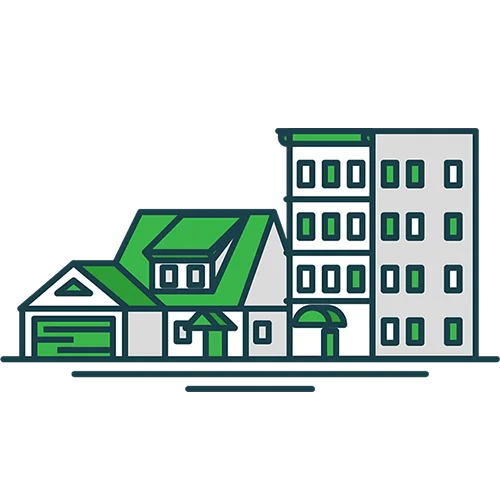What Is Surplus Lines Insurance?
- Insurance 101
- /
- What Is Surplus Lines Insurance?
The surplus lines market makes up about 9% of the property and casualty insurance industry. It exists as a supplemental market and doesn’t directly compete with the admitted, standard market. You can find surplus lines insurance for a variety of risks, residential and commercial.
The surplus lines market is regulated and serves a vital purpose in the insurance landscape. Use this guide below for an overview of surplus lines insurance and surplus lines insurance companies.
What Is Surplus Lines Insurance?
Surplus lines insurance is insurance from a non-admitted carrier. It often entails coverage for things the standard market is unwilling or unable to cover. Although not backed by state governments like admitted carriers are, surplus lines insurers are often more specialized and flexible than admitted insurance companies.
Since surplus lines are often more specific or selective, they can have higher premiums. But, it will ultimately depend on your chosen carrier and what you want to be covered. They often need to charge higher premiums since you’re paying for their flexibility and specialization. There may also be additional taxes or service fees that admitted carriers don’t have due to their backing by the state.
Admitted vs. Non-Admitted Insurance Companies
Insurance companies fall into two categories: admitted and non-admitted carriers. Admitted insurers comply with state regulations and get a license where they do business. This involves filing rates and requirements with the state insurance department and paying into a state fund used to pay claims if any licensed insurers go bankrupt or insolvent.
Non-admitted carriers operate outside of the state-regulated market. They do this not because they can’t get licensed in a state, but rather because they choose to go unlicensed. Being free from state regulations means non-admitted carriers can be more flexible with their coverage and accept broader risks.
Non-admitted surplus lines insurance companies are often used for more specific or significant risks that the admitted market is unwilling or unable to cover. Surplus lines insurers are crucial for homeowners or businesses that get refused coverage by admitted carriers.
Since non-admitted carriers don’t pay into the state guaranty fund, there is a possibility that you won’t be able to recoup any money when you file a claim if the surplus lines insurer goes bankrupt. But, every state has some rules and regulations for surplus lines companies, and they typically monitor surplus carriers’ financial health.
Examples of Surplus Lines Insurance
Surplus lines insurance is often for coverage risks that the admitted market won’t cover. These risks can be commercial or residential. Some examples of what can be covered by surplus lines insurance policies include:
Surplus lines insurance companies can cover homes and business admitted insurance companies can’t or won’t cover. Exceptionally high-risk homes could be houses in wildfire-prone locations or hurricane-prone areas that standard insurance companies will no longer cover in states like California or Florida. It could also include homes on the edges of cliffs or a unique construction that state-regulated insurance companies can’t cover due to their writing restrictions.
Some businesses must also turn to non-admitted carriers. Businesses with significant or unique liability are common customers of the surplus lines market. This could range from food truck operations to child care to hazardous material transportation.
Sometimes, start-ups need surplus lines insurance if they’re inventing a new product or doing cutting-edge research. If it’s something that’s never been seen or done before, an admitted carrier may not want to or be able to cover it due to their compliance with state regulations. This is why surplus lines insurance companies are so important.
Suppose a risk starts to become commonplace among surplus lines carriers. Sometimes, admitted carriers may see how to cover the risk and eventually start accepting and underwriting the risk. Conversely, a certain risk factor can also become too difficult to cover for admitted carriers. They may all stop covering it. If this happens, a surplus lines carrier can come in and offer coverage to those who now need it.
There are also times when a business owner or property owner has too many claims or too poor of credit to get insurance from an admitted carrier. These people, too, may find coverage from a non-admitted insurance company.
Is There a List of Surplus Lines Insurance Companies?
Many states have lists of approved surplus lines insurance companies, so consumers aren’t left in the dark. States won’t guarantee the payment of claims from a surplus lines company if it fails, so it’s important to do your due diligence before deciding on a carrier.
Although not financially backed by a state guaranty fund, surplus lines insurance companies are still subject to state and federal laws and often have to maintain a minimum amount of capital and surplus to operate.
To find approved surplus lines carriers in your state, you can look at your state’s insurance department. They may have a look-up tool like Florida or publish a lists like Missouri or Arizona. Some states have both. You should be able to find a list of permitted surplus lines insurance carriers in your state by looking it up.

We partner with the nation's top home insurance companies so you can get an excellent policy at an affordable price.
The editorial content on Clovered’s website is meant to be informational material and should not be considered legal advice.
Similar Articles